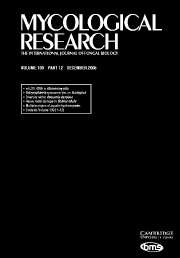Crossref Citations
This article has been cited by the following publications. This list is generated based on data provided by
Crossref.
Ravishankar, J.P.
Davis, Christopher M.
Davis, Diana J.
MacDonald, Erin
Makselan, Stephanie D.
Millward, Laurie
and
Money, Nicholas P.
2001.
Mechanics of Solid Tissue Invasion by the Mammalian Pathogen Pythium insidiosum.
Fungal Genetics and Biology,
Vol. 34,
Issue. 3,
p.
167.
Weber, Roland W. S.
Wakley, Gavin E.
Thines, Eckhard
and
Talbot, Nicholas J.
2001.
The vacuole as central element of the lytic system and sink for lipid droplets in maturing appressoria ofMagnaporthe grisea.
Protoplasma,
Vol. 216,
Issue. 1-2,
p.
101.
Elliott, Monica L.
and
Henson, Joan M.
2001.
Effect of osmotic stress on growth ofGaeumannomyces graminisstrains differing in hyphal pigmentation.
Mycologia,
Vol. 93,
Issue. 4,
p.
617.
Noiraud, Nathalie
Maurousset, Laurence
and
Lemoine, Rémi
2001.
Transport of polyols in higher plants.
Plant Physiology and Biochemistry,
Vol. 39,
Issue. 9,
p.
717.
Ambikapathy, Jesmini
Marshall, Jerry S.
Hocart, Charles H.
and
Hardham, Adrienne R.
2002.
The Role of Proline in Osmoregulation in Phytophthora nicotianae.
Fungal Genetics and Biology,
Vol. 35,
Issue. 3,
p.
287.
Trail, Frances
Xu, Haixin
Loranger, Rachel
and
Gadoury, David
2002.
Physiological and environmental aspects of ascospore discharge inGibberella zeae(anamorphFusarium graminearum).
Mycologia,
Vol. 94,
Issue. 2,
p.
181.
Carvalho, Abel
Pio, Casimiro
and
Santos, Carla
2003.
Water-soluble hydroxylated organic compounds in German and Finnish aerosols.
Atmospheric Environment,
Vol. 37,
Issue. 13,
p.
1775.
Hooley, P.
Fincham, D.A.
Whitehead, M.P.
and
Clipson, N.J.W.
2003.
Advances in Applied Microbiology Volume 53.
Vol. 53,
Issue. ,
p.
177.
Fischer, Mark
Cox, Justin
Davis, Diana J.
Wagner, Andrew
Taylor, Richard
Huerta, Alfred J.
and
Money, Nicholas P.
2004.
New information on the mechanism of forcible ascospore discharge from Ascobolus immersus.
Fungal Genetics and Biology,
Vol. 41,
Issue. 7,
p.
698.
Ramirez, M.L.
Chulze, S.N.
and
Magan, N.
2004.
Impact of osmotic and matric water stress on germination, growth, mycelial water potentials and endogenous accumulation of sugars and sugar alcohols in Fusarium graminearum.
Mycologia,
Vol. 96,
Issue. 3,
p.
470.
Trail, Frances
Gaffoor, Iffa
and
Vogel, Steven
2005.
Ejection mechanics and trajectory of the ascospores of Gibberella zeae (anamorph Fuarium graminearum).
Fungal Genetics and Biology,
Vol. 42,
Issue. 6,
p.
528.
GLEASON, Frank H.
MIDGLEY, David J.
LETCHER, Peter M.
and
McGEE, Peter A.
2006.
Can soil Chytridiomycota survive and grow in different osmotic potentials?.
Mycological Research,
Vol. 110,
Issue. 7,
p.
869.
Clipson, Nicholas
Otte, Marinus
and
Landy, Eleanor
2006.
Fungi in Biogeochemical Cycles.
p.
436.
Alves, Célia
Pio, Casimiro
Carvalho, Abel
and
Santos, Carla
2006.
Atmospheric carbonaceous aerosols over grasslands of central Europe and a Boreal forest.
Chemosphere,
Vol. 63,
Issue. 1,
p.
153.
Andersen, M.
Magan, N.
Mead, A.
and
Chandler, D.
2006.
Development of a population‐based threshold model of conidial germination for analysing the effects of physiological manipulation on the stress tolerance and infectivity of insect pathogenic fungi.
Environmental Microbiology,
Vol. 8,
Issue. 9,
p.
1625.
Kogej, Tina
Stein, Marlene
Volkmann, Marc
Gorbushina, Anna A.
Galinski, Erwin A.
and
Gunde-Cimerman, Nina
2007.
Osmotic adaptation of the halophilic fungus Hortaea werneckii: role of osmolytes and melanization.
Microbiology,
Vol. 153,
Issue. 12,
p.
4261.
Galiano, Luis
Blackburn, Mandy E.
Veloro, Angelo M.
Bonora, Marco
and
Fanucci, Gail E.
2009.
Solute Effects on Spin Labels at an Aqueous-Exposed Site in the Flap Region of HIV-1 Protease.
The Journal of Physical Chemistry B,
Vol. 113,
Issue. 6,
p.
1673.
Money, Nicholas P.
and
Fischer, Mark W. F
2009.
The Mycota.
Vol. 5,
Issue. ,
p.
115.
Yafetto, Levi
Davis, Diana J.
and
Money, Nicholas P.
2009.
Biomechanics of invasive growth by Armillaria rhizomorphs.
Fungal Genetics and Biology,
Vol. 46,
Issue. 9,
p.
688.
Uyar, Ebru Ozer
Hamamci, Haluk
and
Türkel, Sezai
2010.
Effect of different stresses on trehalose levels inRhizopus oryzae.
Journal of Basic Microbiology,
Vol. 50,
Issue. 4,
p.
368.


